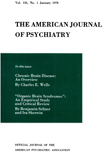Emergency room medical clearance: an educational problem
Abstract
The term "medically clear" has a greater capacity to mislead than to inform correctly. The overuse of this term, especially in emergency room settings, may indicate difficulties in medical education and in the consultation/referral process between psychiatry and other specialties; further, it results in poor patient care. Nonpsychiatric physicians may prematurely refer patients as medically clear because of their unfamiliarity or discomfort with clinical psychiatry. Psychiatrists often ask for medical clearance of patients to hide their discomfort with or antipathy toward clinical medicine. The use of emergency room settings for interspecialty collaboration and training helps minimize the underlying difficulties that lead to the use of this term by fostering psychiatric skills in nonpsychiatrists and a sense of medical identity in psychiatrists.
Access content
To read the fulltext, please use one of the options below to sign in or purchase access.- Personal login
- Institutional Login
- Sign in via OpenAthens
- Register for access
-
Please login/register if you wish to pair your device and check access availability.
Not a subscriber?
PsychiatryOnline subscription options offer access to the DSM-5 library, books, journals, CME, and patient resources. This all-in-one virtual library provides psychiatrists and mental health professionals with key resources for diagnosis, treatment, research, and professional development.
Need more help? PsychiatryOnline Customer Service may be reached by emailing [email protected] or by calling 800-368-5777 (in the U.S.) or 703-907-7322 (outside the U.S.).



